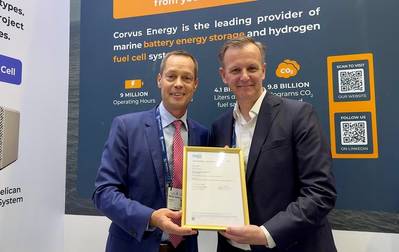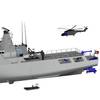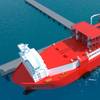Corvus' Pelican Fuel Cell System Awarded DNV Type Approval
Corvus Energy announced that the Corvus Pelican Fuel Cell System has received Type Approval from DNV. The system, which was developed through the three-year-long H2NOR project, is the first Fuel Cell System (FCS) designed to be inherently gas-safe.
Receiving type approval from DNV, a leading maritime classification society, confirms that the Corvus Pelican Fuel Cell System meets the most stringent performance and safety standards required by the maritime industry.
Olaf Drews, Head of Engines & Pressurized Equipment Maritime, said, "It is a special fuel cell system, because the Pelican uses nitrogen for inerting of the fuel cell space. It is the first fuel cell system that uses this technology and this brings it to a very preferred safety level. This is a milestone, and we look forward to the first ship project."
Corvus CEO, Fredrik Witte said, “Toyota`s unsurpassed knowledge in developing high-quality and efficient fuel cells, in addition to the strong collaboration and high level of maritime experience among the partners in this development project, has been key. This is a milestone for net zero shipping. We now have a high-quality range extender to add to our existing ESS portfolio with the scalability and the safety needed to be a real driver in the future of marine decarbonization.”
Proven in more than 30,000 cars worldwide, the building block of the Pelican FCS is a PEM (Proton Exchange Membrane) fuel cell module from Toyota. According to Thiebault Paquet, Vice President of Toyota Hydrogen Factory Europe, “DNV Type Approval demonstrates that Toyota fuel cell technology is transferable to the marine sector and is a viable solution to support maritime decarbonization efforts.”
The first Corvus Pelican Fuel Cell System is produced and ready to be installed on board MS Skulebas, a 35-meter fishing and training vessel owned by Vestland County and operated by Måløy Upper Secondary School in Norway. The vessel already has a 1 MWh battery system onboard. By adding the Corvus Pelican Fuel Cell System and hydrogen storage, the vessel will be able to operate for four days on zero emission.















